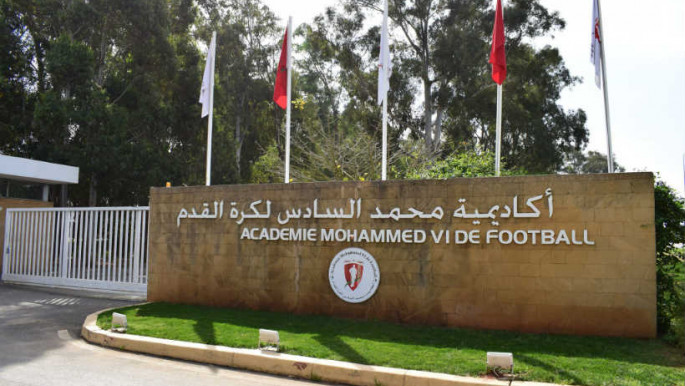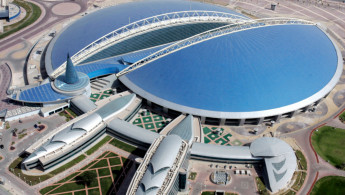A new wave of football academies is revolutionising Arab sport
Academies that search for young talent and integrate potential future stars in highly-qualifying programmes, providing them with intensive and demanding care, with the power of socialisation around the sport, remain rare in the Middle East and North Africa.
But the region has slowly been seeing the development of institutions that organise the combination of sports learning with school curricula in a major transformation in accessing the professional footballer career path in the Arab world.
Aspire in Qatar and Mohammed VI in Morocco are two examples of football academies that have adopted this combination as a strategy to train young talent, and prepare them culturally, physically, and technically to become professional players.
Aspiring to World Cup glory
Aspire Academy represents the practical side of a long-term strategy to make Qatar a reference point in sports not only in Gulf countries and Asia, but all over the world.
The academy was founded in 2004 with the goal of finding and developing the best young Qatari athletes, while also providing them with high-quality secondary school education.
Speaking to The New Arab, Said Rizki, a football analyst and coach based in Qatar, said the idea was to set up a sport centre with international standards to train professional footballers, combining sport and studies:
"The programme adopted is known as LTPD - long term players' development. Which is based on four elements: culture, studies, physical preparation and tactical–technical training.
Twitter Post
|
"The focus has always been on the player of 'tomorrow'. This player is the one we saw in the latest Asian cup of football, winning the title for the first time in the history of Qatar. The majority of the national team players who won the cup came from Aspire."
Aspire isn't just about football. It's a multi-sports centre where there are athletics, handball volleyball, basketball, among others.
The training also targets languages, communication, management of risks and crises, in addition to all the aspects that can make a "professional" sportsperson. It also provides would-be players with the opportunity to gain experience at an international level.
"A 15-year-old player can benefit from several international tours during the academic year," said Rizki. "It is because of this that we have seen recently at the Asian Cup, 19- or 20-year-old players with the maturity and experience as if they were 30 years old."
The academy scouts clubs and schools as well as using their own Talent Centres. It offers scholarships to the best young Qatari athletes who are selected to join Aspire.
In 2014 The Qatari U-19 national football team's players - who won the Asian Football Cup in Myanmar - were all from Aspire. Moreover, The team which qualified for the 2015 FIFA U-20 World Cup in New Zealand, were also all students of Aspire Academy.
After winning the Asian Cup 2019, the academy's main goal is to form a strong national team to represent Qatar at the FIFA World Cup 2022.
 |
Mohammed VI, the backbone of Morocco
Set up in 2008, the Mohammed VI Football Academy is a football training centre imagined as a practical and strategic solution to empower Moroccan football and serve as a national model of training in terms of law, supervision, financing, and infrastructure.
In May 2008, King Mohammed VI announced the construction of the academy - a project requiring an investment of 140 million Dirhams ($15 million). The goal of the academy is to train students in the "profession" of football, and to produce players of international quality.
A decade after its launch, the results are positive. Speaking to The New Arab, Nasser Larguet, the former technical director of the academy and current technical director of Morocco's national team, stresses the overall objective of the academy to train young talents to become professional players:
"47 out of 57 players who attended the academy during my presence are now professional footballers, with nine in Europe and 38 in Morocco's first and second league.
"Youssef En-Nesyri [Leganes], Hamza Mendyl [FC Schalke] and Ahmed Reda Tagnaouti [Wydad Casablanca] have participated with the national team in the African Cup in Gabon 2017, and the FIFA World Cup in Russia 2018," said Larguet.
With a focus on mental and physical preparation over the past five years, young players from the academy have participated in a variety of international championships, forming the backbone of Morocco's national teams. They have been gold medalists at the Islamic and Mediterranean Games, Champions of the U-21 Danone Cup in Marrakech with 10 players from the Academy, gold medal winners at the Franchophone Games, champions of the African Youth Games, and winners of the African championship (CHAN).
Morocco U-23's coach, Mark Wotte, describes the quality of the players at the Mohammed VI academy as "exceptional", compared with individual clubs' training centres in Morocco.
"It is normal to me because the academy has an extraordinary set-up infrastructure and means to develop elite players," Wotte told The New Arab.
Teams in Morocco must give more opportunities to young academy graduates, says Wotte, otherwise they will move to Europe at an early age. It's not like they'd be without precedent: En-Nesyri, Hicham Boussefiane and Abaqar all went to Malaga, while En-Nesyri went on to Leganes, Mendyl headed for Lille and then Shalke, Naif Aguerd found playing time for Dijon, Mourid joined En-Nesyri at Leganes, and Oussama Falou and Azzadine Ounahi both headed for Strasbourg.
"Talent management into the first teams in Morocco is not very good, so the step to European Clubs at 18 years old is the best 'next step' for young players," Wotte concluded.
Jalal Bounouar is a reporter from Morocco.
Follow him on Twitter: @BounouarJalal



